“In my considered judgment, and in the light of the experience of this century, continued negotiations remain the only way by which the immediate problem can be disposed of upon any lasting basis. Should you agree to a solution in this peaceful manner I am convinced that hundreds of millions throughout the world would recognize your action as an outstanding historic service to all humanity.”
~President Franklin D. Roosevelt
Letter to Adolf Hitler, September 27, 1939

1903 – Old 97, officially known as the Fast Mail, derailed at the Stillhouse Trestle near Danville, Virginia.
Due to excessive speed in an attempt to maintain schedule, the train careered off the side of the bridge, killing eleven on-board personnel and injuring seven others.
The Wreck of the Old 97 later became the subject of a popular ballad; it clearly placed the blame for the wreck on the railroad company for pressuring 33-year-old Engineer Joseph A. “Steve” Broady to exceed a safe speed limit.

1908 – The first production of the Ford Model T automobile was built at the Ford Piquette Avenue Plant in Detroit.
The Piquette plant could not keep up with demand for the Model T – cars were assembled by hand – and only 11 cars were built there during the first full month of production.
Eventually, the workers were able to increase the output to 100 cars on a daily basis, but still was too slow.
In 1910, Ford moved the company to the new Highland Park complex. During this time the Model T production system transitioned into an iconic example of assembly line production.
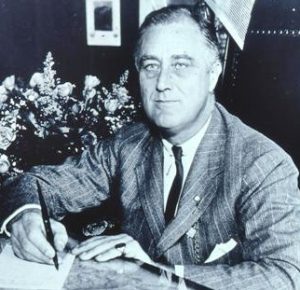
1938 – President Franklin Roosevelt wrote to German Chancellor Adolf Hitler regarding the threat of war in Europe.
The German chancellor had been threatening to invade the Sudetenland of Czechoslovakia and Roosevelt reiterated the need to find a peaceful resolution to the issue.
Hitler believed Germany was entitled to the area because of the “shameful” way in which the Treaty of Versailles, which ended World War I, made Germany a “pariah” in the community of nations.
That treaty had given the Sudetenland – a territory that was believed by Hitler and many of his supporters to be inherently German – to the state of Czechoslovakia.
Roosevelt assured Hitler that the U.S. would remain neutral regarding European politics, but that America recognized a responsibility to be involved “as part of a world of neighbors.”

1939 – The Siege of Warsaw came to an end when Poland surrendered after weeks of resistance to invading forces from Nazi Germany.
Two days earlier, an artillery and air bombardment, including 1,200 German aircraft, blasted the city in what became known as “Black Monday”.
The city water works were destroyed by German bombers and all boroughs of Warsaw experienced a lack of both potable water and water with which to extinguish the fires caused by the constant bombardment. Lack of support from the Western Allies made the defense of the city pointless.
The Polish Army surrendered nearly 140,000 troops. During the siege, around 18,000 civilians of Warsaw had perished and 10% of the city’s buildings were entirely destroyed and further 40% were heavily damaged.
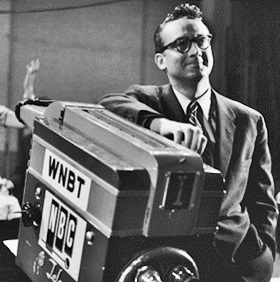
1954 – Tonight Starring Steve Allen made its debut on NBC. Allen’s sidekick was Gene Rayburn, who would eventually become best known as host of Match Game.
Allen left in 1957 and since then the show has gone through several changes and hosts: Tonight Starring Jack Paar; The Tonight Show Starring Johnny Carson (still the best, in my opinion); The Tonight Show with Jay Leno; The Tonight Show with Conan O’Brien; The Tonight Show Starring Jimmy Fallon.

1962 – Rachel Carson’s environmental science book Silent Spring was published.
The book – named one of the 25 greatest science books of all time by the editors of Discover Magazine – was met with fierce opposition by chemical companies since it came at a time when petrochemical-based pesticides were generally regarded as a modern miracle for home gardeners and industrial agriculture alike.
Carson’s book spurred a reversal in national pesticide policy, led to a nationwide ban on DDT for agricultural uses, and inspired an environmental movement that led to the creation of the U.S. Environmental Protection Agency.
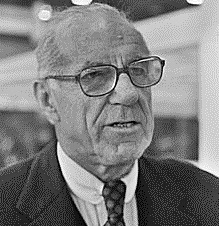
1967 – An advertisement headed “A Call To Resist Illegitimate Authority,” signed by over 320 influential people (professors, writers, ministers, and other professional people), appeared in the New Republic and the New York Review of Books, asking for funds to help youths resist the draft.
In Washington, Senator Thurston B. Morton (R-Kentucky), told reporters that President Johnson had been “brainwashed” by the “military-industrial complex” into believing a military victory could be achieved in Vietnam.
Johnson felt the sting of such criticism and he was also frustrated by contradictory advice from his advisors. Still, he thought that slow and steady progress was being made in Vietnam based on optimistic reports coming out of the U.S. military headquarters in Saigon.
The advertisement led to the arrest of five of its signers, known as the Boston Five (Michael Ferber, Dr. Benjamin Spock (shown above), William Sloane Coffin, Mitchell Goodman, and Marcus Raskin) for “conspiring to ‘counsel, aid, and abet’ young men to refuse service in the armed forces and to refuse to have in their possession registration certificates and notices of classification.”
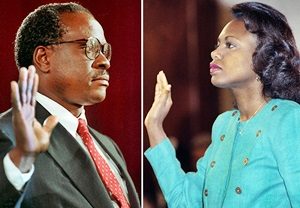
1991 – The Senate Judiciary Committee deadlocked, 7-7, on the nomination of Clarence Thomas to the Supreme Court.
The nomination proceedings had been contentious from the start, especially over the issue of abortion, and many women’s groups and civil rights groups opposed Thomas on the basis of his conservative political views.
And then came Anita Hill.
“Inappropriate behavior” allegations by Hill, a law professor who had previously worked under Thomas at the United States Department of Education and then at the Equal Employment Opportunity Commission, were leaked to the media from a confidential FBI report.
The hearings after the leaked report became notable for their sexually explicit content in testimony never before heard in a Supreme Court nomination.
During his testimony, Thomas called the hearings a “high-tech lynching.”
“This is a circus. It’s a national disgrace. And from my standpoint, as a black American, it is a high-tech lynching for uppity blacks who in any way deign to think for themselves, to do for themselves, to have different ideas, and it is a message that unless you kowtow to an old order, this is what will happen to you. You will be lynched, destroyed, caricatured by a committee of the U.S. Senate rather than hung from a tree.”
Thomas was confirmed by the full Senate with a 52 to 48 vote. 41 Republicans and 11 Democrats voted to confirm. 46 Democrats and 2 Republicans voted to reject.
A nominee and a professor. Hmm, this all sounds familiar.
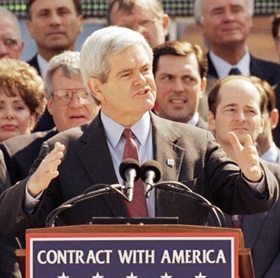
1994 – More than 350 Republican congressional candidates signed the “Contract with America,” a 10-point platform they pledged to enact if voters sent a GOP majority to the U.S. House.
Written by Newt Gingrich (R-GA) and Dick Armey (R-TX) – and in part using text from former President Ronald Reagan’s 1985 State of the Union Address – the Contract was introduced six weeks before the 1994 Congressional election, the first mid-term election of President Bill Clinton’s administration.
It detailed the actions the Republicans promised to take if they became the majority party in the United States House of Representatives for the first time in 40 years. Many of the Contract’s policy ideas originated at The Heritage Foundation, a conservative think tank.
The contract worked out well for the Republicans. They gained 54 House and 9 U.S. Senate seats, giving the GOP majorities in both wings of Congress for the first time since the 1950s.
Gingrich (shown above) was a major winner in the Republican victory. He became Speaker of the House, and in 1995, Time named him “Man of the Year” for “his role in ending the four-decades-long Democratic majority in the House.”
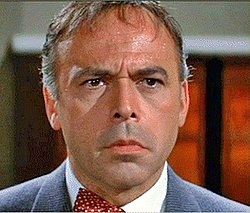
2012 – Actor Herbert Lom died of natural causes at the age of 95.
He appeared in over 60 films, including Spartacus, The Ladykillers, and El Cid, but he is best known for his portrayal of Chief Inspector Charles Dreyfus, the long-suffering superior of Inspector Jacques Clouseau – played by Peter Sellers – in several of the Pink Panther films.

2012 – The deadliest workplace shooting in Minnesota’s history occurred when Andrew Engeldinger, an employee at Accent Signage Systems in Minneapolis, went on a shooting rampage after being fired.
Six victims died in the rampage – four on the day of the shooting and two who died as a result of their wounds in the following weeks.
Engeldinger also died after committing suicide with his Glock 19 9mm pistol.

2017 – Hugh Hefner, the founder of Playboy – with $1,000 borrowed from his mother – and editor-in-chief and chief creative officer of the magazine until 2016, died after suffering cardiac arrest and respiratory failure. He was 91.
Compiled by Ray Lemire ©2018 RayLemire.com / Streamingoldies.com. All Rights Reserved.
LOL; No serious comment today but your mention of the “Pink Panther” came on top of a recent conversation about my girlfriend Sherry calling me to go to the movies. She told me to tell my Mother it was a comedy & I got to go. I especially remember the bedroom scene with the champagne. It was quite risque & shocking back then.
Lee… I’m so happy I could put a smile on your face. We all need more of those these days. 🙂